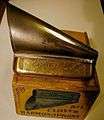C. A. Seydel Söhne
Christian August Seydel founded the C. A. Seydel Söhne harmonica factory in Klingenthal, Sachsen in 1847. The firm, C. A. Seydel Söhne, remains the oldest harmonica factory in the world and manufactures a wide range of harmonicas.
 | |
| GmbH | |
| Genre | Musical Instruments Factory |
| Founded | October 27th, 1847 |
| Founder | Christian August Seydel |
| Headquarters | Klingenthal/Sa., Germany |
Key people | Lars Seifert, manager |
| Products | Harmonicas |
| Owner | NIAMA-Media |
Number of employees | 18 |
| Website | www.seydel1847.com |
History
In the 17th century the Seydel family were miners in Sachsenberg-Georgenthal/Saxony. When mining ceased in Saxony Vogtland, the brothers Johann Christian Seydel and Christian August Seydel began working as instrument makers. Both subsequently became approved harmonica makers. This was decreed by the court of Untersachsenberg on October 27, 1847. The certificate contains the first documented reference to the company, with Christian August Seydel being registered as the company founder. The factory was established in Klingenthal at the foot of the famous 'Aschberg' (literally ‘Ash Mountain’) and became one of the biggest harmonica factories in Saxony. In 1882, C.A. Seydel died, and his son Richard took over. One year later his brother Moritz joined them, and the company name changed to C.A.Seydel Söhne. (C.A. Seydel and Sons).
Seydel harmonicas
Blues (diatonic) models
1847 series - This series includes the Classic, Silver and Noble. All are similar but the classic has a wood comb, Silver has a plastic comb and the Noble has an aluminum comb with vented sides. The 160th anniversary model is similar but with luxury components and is only available in the key of C. Only 160 of these were produced. These models have stainless steel reeds. Lightning - The latest and top of the line 1847 model is the Lightning made of steel including the comb. Aside from the luxury components and extra attention to every detail the biggest feature is the use of polished steel reeds the polishing process adds to the quality of the sound and the longevity of the reeds removing any future spots for reed failure. The Comb being made of steel makes this model heftier to hold in a good way. And the quality of the finish inclusing the highly buffed mouth holes make it extremely comfortable to hold and to play .
Big Six- These models have only six holes with stainless steel reeds. The classic model is only available in the Key of C and has a wood comb. The standard model is available in 6 keys and 6 colors. The blues version is tuned like the first 6 holes of a standard diatonic. The folk version is tuned to holes 4-9 on a standard diatonic.
Session Steel- This model has an orange plastic comb (or other colors if a Summer or Winter edition harmonica) it has stainless steel reeds and full length covers.
Favorite-This model has brass reeds and an aluminum comb.
Session-This model is the same as the Session Steel but with brass reeds and a black comb. The "antique" version as brass colored cover plates.
Solist Pro-Model is similar to the Hohner Marine Band 1896, but with rounded holes and screws.
Solist Pro 12 Steel- This model is similar to the Hohner SBS. However, this model has 12 holes instead of 14 is available in Low C, Low D, C, and A. The idea is that you get a low octave under the standard diatonic. However compared to the SBS, this model is missing the 10 hole on a standard diatonic.
Chromatic models
Symphony- High end 16-holer with stainless steel reeds.
Saxony- This model is a chromatic harmonica with stainless steel reeds.
De Luxe- High end chromatic model with brass reeds.
De Luxe Steel- Same as the De Luxe with stainless steel reeds and an improved mouthpiece.
Standard- Standard chromatic model with brass reeds.
Tremolo and Octave models
Fanfare-S- This model is a tremolo model with Stainless steel reeds
Fanfare-This model is the same as Fanfare-S with brass reeds.
Sailor- Standard model with brass reeds.
Mountain harp- Standard model larger than Sailor model.
Concerto- Octave model with brass reeds
Club- Curved octave harmonica.
Notable Seydel Harmonica players
- Charlie Musselwhite
- Mark Hummel
- James Cotton
- Frédéric Yonnet
- Ofir Ventura
- Pat Bergeson
- Scott Albert Johnson
- Peter "Madcat" Ruth
- Lazy Lester
- Rob Stone
- PT Gazell
- Aki Kumar
- Will Wilde
- Matthew Prozialeck
- Jake Friel
- Roly Platt
- Ashay Kumar
- Historical Seydel-Harmonicas
 Seydel-Harmonica 1880
Seydel-Harmonica 1880 Clover
Clover Bandmaster
Bandmaster Boomerang-Reconstruction
Boomerang-Reconstruction
External links
- Lars Seifert Interview NAMM Oral History Library (2008)
- Karl Pucholt Interview NAMM Oral History Library (2008)
- The Harmonica Company Worldwide Seydel Harmonicas Retailer